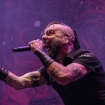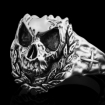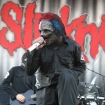Jesse Leach thought he might never sing again. "That was the first thought I had: I'm done, it's over," the Killswitch Engage vocalist remembers, with a nervous laugh. It was late April 2018, and a polyp had developed on his vocal cords. Leach would have to undergo surgery to get it removed. Tour dates were canceled; the future, unknown.
"It sounds really pessimistic, but I knew it was going to happen sooner or later. Because when you come off stage spitting blood … something's going to give at some point," he says. "So I was scared, yeah. I was literally thinking to myself, Well, I guess I can go back to bartending if this doesn't work."

Right after the surgery, Leach not only couldn't sing, but he also couldn't even speak. What followed was an intense three-month recovery period full of speech therapy, vocal therapy and scream therapy. With it, came what the singer describes as "post-surgery depression." His confidence was shot. Much of Killswitch Engage's crushingly heavy new album, Atonement — the band's third since Leach's return after 10 years away — was already done at this point, including a headline-making duet with the group's former frontman Howard Jones; now, Leach wasn't sure if he'd be able to finish the record. It took his bandmate Adam Dutkiewicz — Killswitch Engage's co-founding lead guitarist and the producer of all their records — to shake him out of his hole.
"I was stressed out. I was insecure," the singer admits. "A lot was going on in my head between writer's block and the surgery. It was amazing to have a friend and producer like Adam mentally slap me upside the face and encourage me."
Leach and Dutkiewicz are a striking odd couple, the former, a sometimes painfully sensitive and sincere punk rocker with a hippie soul; the latter, an onstage goofball whose offstage perfectionism and knack for cutting through the bullshit have helped make Killswitch one of the leading heavy bands of their day. Leach and Dutkiewicz have been creating music together on and off across two decades, their clashes and contrasts shaping the sound of modern metalcore in the process. Atonement leans into the heavier, gnarlier side of that sound, which is fitting considering, in Leach's words, how "fucking tough" the album was to make.
Today, the challenges of those writing and recording sessions, stretched out in fits and starts over the last two years, seem like distant memories. We're sitting with the two Killswitch members on some rocks in a park under the Manhattan Bridge, drinking coffee and eating pumpkin-flavored whoopie pies. They look the odd couple: Leach sports a freshly dyed blue mohawk, a large beard, combat boots and a Godflesh Streetcleaner tee, while the tall, clean-shaven Dutkiewicz is wearing a flat-brimmed hat, palm-tree-print shirt and a camo windbreaker. It's a beautiful early summer afternoon, and an elegantly dressed man and woman are posing nearby for wedding photographs. But in typical Dutkiewicz form, what the guitarist notices is the sight of "two pigeons humping."

MUSICIANS SAY BEING IN A BAND IS LIKE BEING IN A MARRIAGE.
ADAM DUTKIEWICZ It really is.
JESSE LEACH And knowing when to take [a break] from each other when necessary or when to come together and band together and get through something together, that's huge.
DUTKIEWICZ A lot of it is being self-aware, too. You have to realize you might not be the easiest person to deal with at times so you can't freak out about it. You live on a bus with somebody, what do you expect? You're going to be in somebody's way.
IT'S LIKE KNOWING WHEN YOU'RE AN ASSHOLE.
LEACH And owning it. That helps, too, because then you're able to navigate better when you are more self-aware.
DUTKIEWICZ I'm an absolute piece of shit and I know it so ...
LEACH And I'm a hermit!
The creative marriage between this "hermit" and this "absolute piece of shit" started in 1999, when Killswitch formed in Massachusetts from members of local bands Aftershock (Dutkiewicz and guitarist Joel Stroetzel), Overcast (bassist Mike D'Antonio) and Nothing Stays Gold (Leach). The new group's self-titled 2000 debut LP showed promise, but it wasn't until Killswitch signed to Roadrunner Records and released 2002's Alive or Just Breathing — which, with its Swedish melodic death metal–influenced riffery and Leach's sing/scream vocals, set the template for a decade of metalcore to come — that the band truly came into its own. What followed is established Killswitch lore. The singer, who has battled with depression throughout his life, found himself spiraling, the destabilizing effects of touring taking a crippling toll, and abruptly quit the band — via email. The move could have taken the wind out of Killswitch's sails, but they soon found a replacement in Blood Has Been Shed singer Howard Jones, and over the next 10 years, with him at the helm, the band climbed to even greater heights, including a Grammy nomination, for 2004's "The End of Heartache," and two gold-selling albums. Then in 2012, Jones split, citing, among other things, his own mental health struggles, as well as complications with Type 2 diabetes. But Killswitch were not about to just hand the keys back to Leach, who, during the intervening decade, had sung in bands ranging from the stoner-rock crew Seemless to the tech-metal outfit the Empire Shall Fall, and even reunited with Dutkiewicz in the project Times of Grace. Instead, they made him audition, and the singer won back the job he had so unceremoniously given up 10 years before. Over the course of many tours and two albums, 2013's Disarm the Descent and 2016's Incarnate, he reestablished it as his own.
But in early 2018, as Leach spat up blood offstage, it looked like history might be repeating itself and the singer's second stint in Killswitch could be headed for a similarly miserable end as his first. It didn't help that the group's album-in-the-works was slated to include that high-profile duet with Jones (titled "The Signal Fire," a nod to Jones' current band Light the Torch), which only ramped up the pressure on Leach. Then his voice started to go. "I had lost it, hurt it, damaged it. We both knew it was damaged," Leach says of Dutkiewicz and himself. "So before I flew out of California [for surgery], we had Howard fly in and I was able to be there while he tracked vocals for that song. It was awesome. … I wrote the lyrics, and him and Adam worked on it, and I stood outside the door and just listened."

THE SONG WITH HOWARD SEEMED IT WAS LIKE YEARS IN THE MAKING. IT'S SPECIAL FOR KILLSWITCH FANS.
DUTKIEWICZ I was always friendly with Howard. Respected him and gave him his space after he left and all that. But Howard and I have always been friendly. We've been really tight over the years. Just like I was tight with Jesse after he left. So I think the only awkwardness going forward between Howard and the band was a lot to do with Jesse — Jesse coming to grips. I know Jesse felt uncomfortable singing some of Howard's songs at first. Jesse was intimidated by filling his shoes. And I think there was just this mental hang-up and awkwardness between Jesse and Howard because of that. But one day I was like, "Fucking watch this. We're all going to hang out in a room together and see what happens." And then Jesse was like, "Wait a minute, Howard is, like, the coolest guy in the world. Never mind."
LEACH I didn't know him! But I became very fast friends with him, like, within probably 10, 15 minutes of talking to him. He was super relatable, you're not this thing — because we didn't know each other. All I'm getting is stories and what the media portrays. And it was like, this weird little thing going on between us, but there was nothing going on between us.
DUTKIEWICZ And I'm sure it's intimidating to be a new singer ... in your old band ...
LEACH [Laughs]
DUTKIEWICZ Which when the band hit its most successful part without you.
LEACH Yup.
DUTKIEWICZ So I'm sure there was an intimidation factor, as well.
LEACH Oh, yeah. Absolutely. But it was great. We became fast friends and started texting each other on a weekly basis and found a common ground with mental health issues that we both have. He's a great dude. So it seemed like, for me, what a nice move of solidarity for the band and fans to have him on the record.
DUTKIEWICZ That's what I love. I love that it quiets all the haters. "Do you guys get along?!" Or, "I prefer Howard, I prefer Jesse. Which would you guys prefer?" We don't fucking care! We like both these guys. They're both our friends. And we like making music with the two of them. So, eat it.
LEACH It won't silence the haters, but it will show solidarity and it's a strong symbol.
The duet is a strong symbol, representing a band reclaiming its history. Leach, meanwhile, avoided repeating his own history with Killswitch: Rather than never singing again, following his surgery and recovery, he's emerged a stronger vocalist. With rehab, training from "The Zen of Screaming" vocal coach Melissa Cross and, of course, Dutkiewicz's tough love, he found his voice again. Or rather a new voice, its nuances noticeable to the observant Killswitch fan. Leach describes it as "more rounded." It's the voice with which he finished Atonement.

WHAT HAS CHANGED ABOUT SINGING FOR YOU, POST-SURGERY?
LEACH It feels different. There is less effort. I'm actually enjoying myself more onstage because the voice is where it needs to be, so I can focus more on the performance, the audience and engaging people. It's made me a better lead singer because the technique has taken precedence over me worrying about my voice, me worrying about hitting those high notes. I was always stressed out onstage. You can see it. You can hear it.
DUTKIEWICZ You were your own worst enemy.
LEACH Yeah. Learning how to use my voice properly was one of the best things to ever happen to me. That surgery was one of the best things to happen to me.
DUTKIEWICZ His brain before sets, before recording. Oh my god ...
LEACH Yup.
DUTKIEWICZ "I gotta do this, like, one-hour long warm-up and fucking pray to these gods and burn all this fucking incense and sage and burn all these candles and pray to something that nothing will go wrong! Ahhhhhh!"
LEACH [Laughs] I still do that.
Leach may be his "own worst enemy," as Dutkiewicz says, but the singer's personal entropy is what gives the well-oiled machine of Killswitch Engage its raw humanity. According to Leach, Dutkiewicz "polishes up my rough edges" — but in truth, as a producer, he leaves a lot of them, too. After all, the singer's messiness and the guitarist's meticulousness give Killswitch its push and pull, that compellingly bipolar mix of melody and menace, singing and screaming that so defines the metalcore sound the band has pioneered. A study in contrasts, like their music, this odd couple truly are friends before they are collaborators, and as such, theirs might prove to be the rare creative marriage that lasts — even if it's with the occasional multi-year break.

YOU GUYS BALANCE EACH OTHER OUT IN A LOT OF WAYS, DON'T YOU?
LEACH I have creativity — but I'm not very skilled. I don't have a musical education, I don't get the concept of music. I just spit out what I feel and it's unrefined, and he's able to take it and move things around and make it make sense.
DUTKIEWICZ In your defense, it's not just you. You should have heard Howard's first version of "The End of Heartache." Oh my god. That was a big rewrite. I'll just leave it at that.
LEACH And now look at it!
DUTKIEWICZ Gotcha, Howard! Woof, that was a dog of a song until we worked on it.
LEACH But that's the beauty of having someone with ears and technical experience and seeing the bigger picture. Especially if you're writing personal, deep shit, you get so stuck in your own head. And that's exactly what happens to me every time.
WAS THAT THE CASE WITH THE SONG "I AM BROKEN TOO"?
LEACH That song still makes me well up in tears. It's not about me — it's about somebody else, but me saying to them, "Look, you've been trying to pretend you're OK, and I know you're not." That line, "If you need proof, I'll reopen my wounds," I had just written that, and Adam was like, "No, you have to bring that in — it's powerful." I'm proud of that song especially. I want to speak to people and let them know they're not alone.
ON ATONEMENT'S "BITE THE HAND THAT FEEDS," YOU SCREAM, "WHAT WOULD YOU KILL FOR?/WHAT WOULD YOU DIE FOR?" WHAT WOULD YOU GUYS KILL OR DIE FOR?
LEACH I would kill to defend a loved one. I would die for my convictions, which I believe that everyone has equal rights, and everyone should be treated a certain way. And I abhor violence — I abhor all that shit — but when push comes to shove, I will defend someone to the death that I love, absolutely.
DUTKIEWICZ Pizza and beer.
They both laugh.








